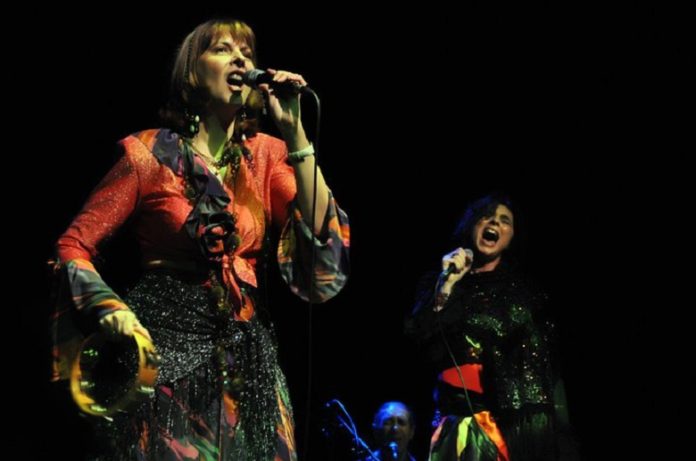Odjila Ensemble was founded in 1983. The word Odjila is a compound of two words in the Romani language: Odji meaning “soul” and djila meaning “song”. That name reflects their concept of Romani music – “music of the soul”. Odjila has been thrilling the audience around the world with their impressive artistic performances of the recognizable traditional music of the Roma people of Eastern Europe.
Singers of the ensemble, Sanja Uzelac and Davorka Daša Bosnić, gave us an interview on the occasion of their concert held in Zagreb in the “Vatroslav Lisinski” Concert Hall on October 24, 2017.
You have already performed in Zagreb. When was that?
Sanja: Yes, several times, but it was a long time ago. We keep really beautiful memories, so we find it a bit strange that it has been so long since the last concert we held here. Given the great interest that the Zagreb audience takes in our concert tonight, we believe they have missed us just as we have missed them. I am sure that we will have a nice time together tonight.
Daša: Our memories from Zagreb are related to the people we worked with here in the Zagreb area as well as in Croatia in general. For example, our first TV appearance was in a television show edited by Silvia Luks, and it was about a Serbian actress Ružica Sokić. Fruitful cooperation with Croatian Radiotelevision continued and we recorded in Zagreb and Dubrovnik and throughout Croatia.
From the very beginning of your musical performance, you have played Romani music only. It related you also to Romani film and theatre art. Why have you chosen Romani music?
Daša: Love of music and the choice of musical expression is an individual issue, but I would say that the Romani musical language is universal. It connects all people around our planet. Romani music evokes archetypal images, something that happened to us in the very origin of mankind that moves and drives us forward in order to discover our “personal story”. Romani music first reveals the parts of ourselves, and then it provokes the same thing in someone sitting beside us, in someone who seems quite different and then we finally realize how much we are connected. I could compare it to the strongest foundations built deep within us.
Sanja: Our choice to play Romani music was not a conscious act at all. It touched us and stayed.
Daša: All of us from Odjila felt it individually and we nourished that feeling, only later time was right for us to meet. The two of us were singing in the same choir, and then Sanja came up one day with information that there were two guys playing Romani music and that we could join them. We listened to our inner voice and so our joint performance began. In general, we tend to listen to that inner voice in our lives, voice that has brought us to Zagreb tonight.
Is there any difference between the audience today and the audience years ago, what are your impressions after the concerts?
Daša: The music we nourish brings together people who still preserve their soul, who nurture emotions and are willing to let these emotions go. Sometimes it was easier because the media’s support was bigger so the audience had already been prepared for what was expected before the concert itself, but even today, young people react equally when they feel it. Today, some accidentally wander into our concert, but even they cannot remain indifferent. They are touched by our honesty on the stage and the authenticity that implies both our weaknesses and virtues. What we feel we transmit to the audience, and then the audience opens to us, so all of us together are overtaken by the mutual energy to the rhythm around us. The image you carry in yourself, the sound of the soul, the courage to be visible and the ability to see and feel the other human being with whom you share the same space – that is Romani music.
Sanja: The biggest compliment is when people from the audience approach us, during or after the concert, evidently surprised by the strength of the emotions they felt, delighted by the music and performance that inspired them. We are particularly pleased when this happens with people from the audience who, so to speak, are not our audience and who usually listen to some other type of music. Often it happens at the concerts we hold during the summer festivals. This is the best indication that
people have recognized honest emotions, that we have managed to convey them, and that they have succeeded in receiving them.
Daša: We are not perfect either as individuals or as a group, but we are honest and every audience recognizes that.
You’ve been working professionally for more than thirty years, during which you have held many concerts all over the world, released five albums and participated, both as musicians and as actors, in several movies (The Dark Side of the Sun, Second Man and Eighth Day of the Week) and the theatre play We Fly, We Will Meet. You have also won numerous awards and have been well-received at world music festivals. What is the secret of your versatile and long-lasting artistic creation?
Daša: Artistic work cannot be separated from life. Every time we sing, we do it as it is the first and the last time because we have never been what we are now and never will repeat this moment. Every moment experienced in life leaves a trace on a person and it is felt in the way they play or sing. That is the liveliness incorporated within the Romani music. Today, the Roma are still, wherever they are, largely marginalized, but they have themselves and their own specific life emotion so beautifully expressed in their music.
Sanja: When we were at the beginning of our career, some thirty years ago, we loved one another so much that the idea was to live together in a big house that would have enough space for each of us and our families with a huge shared living room being a place for socializing, playing and singing. Those were our youthful dreams, but we have taken different roads. Still, it is nice that even today we love one another in the same way. Although we do not live in the same house, music always brings us together and fills with love and enthusiasm. So, impregnated with this tremendous passion for Romani music we approach every concert.












